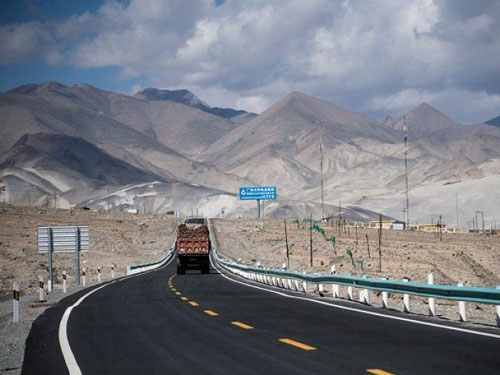Reema Shaukat
THERE is an interesting saying by Lewis Carroll that “if you don’t know where you are going, any road will get you there”. Such is the importance and value of road networks and well-constructed roads in the development and progress of any country. Even the underdeveloped countries prefer building up better roads as it’s the main source of transportation to the far flung areas. Pakistan, since its inception, has focused on the construction of road network throughout the country and from time to time upgradation of existing road infrastructure. The history of transport in modern-day Pakistan dates back to the Indus Valley Civilization. The Grand Trunk Road or famous GT Road was a major road to connect different areas of the Indo-Pak subcontinent. This historic step was taken by Sher Shah Suri in the16th century and it’s still operative. With the passage of time GT Road was developed as the trees were planted and mosques and temples were built alongside the road for the welfare and ease of local populace. Likewise caravan seroys or rest areas were built for travellers. For several centuries, it has linked the eastern and western regions of South Asia, running from Bengal, across north India, into Peshawar in Pakistan. Apart from road networks, railways and airways were also developed.
Pakistan with the passage of time laid network of national highways throughout the country to improve trade and logistics within the country. In the early 1990s, the construction of motorways began with the idea of building a world class road network throughout Pakistan and with the vision to reduce the load on the heavily used national highways across the country. The Makran coastal highway goes along the coast of Sindh and Baluchistan provinces, linking Karachi and Gwadar. After the construction of new coastal highway, the travel time has been reduced to six or seven hours. The highway was built as part of an overall plan to improve transport facilities and development of far off areas in south of Baluchistan. Another state-of-the-art venture is the Karakoram Highway which is the highest paved international road in the world. It connects China and Pakistan across the Karakoram mountain range through the Khunjerab Pass.
China-Pakistan Economic Corridor (CPEC) is considered as a main stake of China’s flagship project of One Belt, One Road Initiative. CPEC is all-inclusive growth program that requires the linking of Gwadar Port to China’s north-western region of Xinjiang through highways, railways, oil and gas pipelines and an optical fibre link. CPEC has provided second opportunity to change the fate of the people of Gilgit-Baltistan after construction of Karakoram Highway in the 1970s. Likewise CPEC encompasses linking all districts and cities of Pakistan through well-built road networks and work is going on at a fast pace for roads connectivity. China’s project of Silk Road is an extensive interconnected network of trade routes across the Asian Continent connecting East, South and Western Asia with the Mediterranean world, including North Africa and Europe. It passes through the midsection of Pakistan through cities like Peshawar, Taxila and Multan.
As an early project of the China-Pakistan Economic Corridor (CPEC), the 118-km-long road from Havelian to Thakot was constructed by the China Road and Bridge Corporation under the Karakoram Highway (KKH) Phase Two project, which consists of the expressway section from Havelian to Mansehra and the secondary road section from Mansehra to Thakot. Likewise Peshawar-Karachi motorway (Multan-Sukkar section) was also completed in the near past. Another project of Khuzdar-Basima road of approximately 110 km is also under construction. Apart from many projects which are in developmental phase, expansion and construction of existing line ML-1 and construction of dry ports under the CPEC project are also underway. Special Economic Zones are another milestone in CPEC which will surely help in boosting better trade facilities and are in construction phase after selection of sites.
The development of the transport road network plays an important role in the economic development of a country and, therefore, the kilometre-age of paved roads existing in a country is often used as an index to assess the extent of its development. The proper development of the transport road network not only reduces the cost of transportation, both in terms of money and time, but also helps in the integration of various regions within the country and the better understanding of neighbouring countries at the international level. In Pakistan, we have terrain of deserts, plateaus, valleys, mountains and plains and therefore to have all areas accessible it is important to have better and safe transport road network. Apart from providing better living opportunities to local populace with the availability of better infrastructure one thing which is often neglected is the potential for tourism.
Pakistan is blessed to have beautiful landscape and diverse weather throughout the year including snowfall in winters and chilly northern areas to enjoy in hot summers. But to attract tourists from outside the country we need to focus on better road facility to untapped hilly areas or along 1000km long coastline of Pakistan where there is matchless beauty of clean beaches and unique variety of seafood. Not only foreigners visit to Pakistan will facilitate earning better economy but tourism within Pakistan can be enhanced with availability of better road conditions, rest areas alongside roads, hotels and resorts, provision of emergency services or basic medical aid. Certainly whatsoever projects are initiated that are for the ease of public but it comes as a huge responsibility of citizens not to spoil or misuse any government or public property. Such things are long-term projects which not only take long time to complete but considering them as a national asset which can be passed on to generations as heritage, it is responsibility of every individual to consider and understand its duty.









